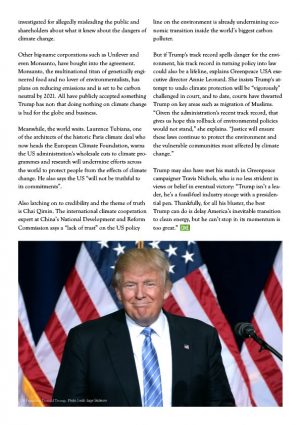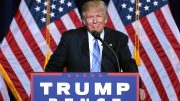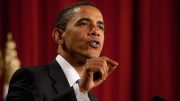 Three days before leaving the White House President Barack Obama sent $500 million to the Green Climate Fund. Then came Donald Trump, and that could be the last cheque to the fund from the US.
Three days before leaving the White House President Barack Obama sent $500 million to the Green Climate Fund. Then came Donald Trump, and that could be the last cheque to the fund from the US.
Trump has dismissed climate change as a “Chinese hoax”, but consternation has gone beyond China. In mid-April not just Beijing, but leaders of Brazil, India and South Africa met and urged industrialised countries such as the USA to honour financial commitments made at the Paris Agreement in 2015. The Green Climate Fund (GLF) was central to that agreement.
Developed countries pledged to pump more cash into the fund, designed to help poorer, climate-vulnerable countries adopt clean-energy technologies. The aim is to raise $100 billion and the recent meeting of climate change ministers from the bloc of four – who represent the biggest emerging economies – ended with each one calling on rich countries to honour their financial commitments.
South Africa’s deputy environment minister Barbara Thompson, for example, said after the April meeting that recent US policy changes were a “major concern”, as well she might. Trump, who questions the scientific basis of global warming, last month confirmed his plan to end to payments to the GCF and signed an order to undo climate change regulations introduced by his predecessor.
Instead, he wants to increase defence spending by $54 billion to be funded through cuts to government agencies and initiatives. The White House has released few details beyond the top-line defence figure, but Union of Concerned Scientists director of strategy and policy Alden Meyer says said it’s a “reasonable long-term assumption” that Trump will release no more money to the GCF.
The Green Climate Fund was set up to advance the goal of keeping the temperature increase on our planet below 2 degrees Celsius. It was established by 194 governments to limit or reduce greenhouse gas emissions in developing countries, and to help adapt vulnerable societies to the unavoidable impacts of climate change.
Despite this noble cause Natural Resources Defense Council (NRDC) director Jake Schmidt agrees with Meyer, and assumes anything marked climate change will “be under a bullseye”. Like all budget measures, the cuts will have to pass through Congress and may face challenges and amendments. Those cuts are set to run wide and deep.
Trump has not only put funding for the GCF on the chopping block, but is seeking to axe funds to the UN climate body (UNFCCC) and contributions to the UN’s climate science panel (IPCC). Trump’s budget director Mick Mulvaney confirmed what everyone already knows recently, telling a reporter the president considers spending on climate change programmes a “waste of money”.
An end to financial support for the Green Climate Fund could effectively remove the US from the Paris Agreement, seen as a major accomplishment by the Obama administration and the nearly 200 other nations, that was years in the making. That has rattled many of those 200 or so other signatories as well as environmentalists.
Yet Trump not only blusters about climate change, he continually stalls and hedges: a key decision on whether the US should stay in the Paris climate deal, due in April, was shelved until a later date. Policy experts insist Trump stands virtually alone in going against the grain. Though the Paris Agreement is non-binding, nearly every country in the world has signed up to reduce emissions.
Even Trump advisers like Secretary of state Rex Tillerson are said to have warned of a diplomatic backlash if America pulls out of the Paris Agreement, which reinforced the goal contain global warming to less than 2 degrees Celsius above pre-industrial-age levels. Meanwhile, several coal and oil firms have urged Trump to stay in the voluntary treaty and try to shape climate talks from within.
America’s biggest oil company ExxonMobil, for example, told the White House in March it believed the Paris agreement was an “effective framework for addressing the risks of climate change” and the US Should remain a party to it. Exxon is currently being investigated for allegedly misleading the public and shareholders about what it knew about the dangers of climate change.
Other big-name corporations such as Unilever and even Monsanto, have bought into the agreement. Monsanto, the multinational titan of genetically engineered food and no lover of environmentalists, has plans on reducing emissions and is set to be carbon neutral by 2021. All have publicly accepted something Trump has not: that doing nothing on climate change is bad for the globe and business.
Meanwhile, the world waits. Laurence Tubiana, one of the architects of the historic Paris climate deal who now heads the European Climate Foundation, warns the US administration’s wholesale cuts to climate programmes and research will undermine efforts across the world to protect people from the effects of climate change. He also says the US “will not be truthful to its commitments”.
Also latching on to credibility and the theme of truth is Chai Qimin. The international climate cooperation expert at China’s National Development and Reform Commission says a “lack of trust” on the US policy line on the environment is already undermining economic transition inside the world’s biggest carbon polluter.
But if Trump’s track record spells danger for the environment, his track record in turning policy into law could also be a lifeline, explains Greenpeace USA executive director Annie Leonard. She insists Trump’s attempt to undo climate protection will be “vigorously” challenged in court, and to date, courts have thwarted Trump on key areas such as migration of Muslims.
“Given the administration’s recent track record, that gives us hope this rollback of environmental policies would not stand,” she explains. “Justice will ensure these laws continue to protect the environment and the vulnerable communities most affected by climate change.”
Trump may also have met his match in Greenpeace campaigner Travis Nichols, who is no less strident in views or belief in eventual victory: “Trump isn’t a leader, he’s a fossil-fuel industry stooge with a presidential pen. Thankfully, for all his bluster, the best Trump can do is delay America’s inevitable transition to clean energy, but he can’t stop it: its momentum is too great.”
Jez Abbott





